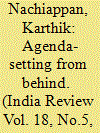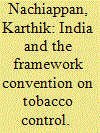| Srl | Item |
| 1 |
ID:
170899


|
|
|
|
|
| Summary/Abstract |
India’s approach and policies at climate change negotiations have garnered considerable interest and attention. Over the last three decades, India’s positions have gained more importance as its carbon emissions rise. In this article, I explain India’s ratification of the Framework Convention on Climate Change (FCCC) using the New Interdependence approach, a framework that explains state behavior by analyzing how global rules affects the domestic politics and policymaking around a particular issue. Specifically, I map how the conflicts around which countries should address global warming influenced the domestic politics of climate change in India, particularly the rise of MEA in leading India’s policymaking on climate change, including FCCC negotiations. MEA’s political understanding of climate change, sharpened by two domestic environmental groups – TERI and CSE, decisively shaped India’s approach at FCCC negotiations. Indian negotiators focused on hammering the differences between developed and developing countries helping shape a Framework Convention that differentiated climate responsibilities based on development constraints.
|
|
|
|
|
|
|
|
|
|
|
|
|
|
|
|
| 2 |
ID:
185098


|
|
|
|
|
| Summary/Abstract |
This paper investigates why India actively negotiated and ratified the Framework Convention on Tobacco Control (FCTC), the first global health treaty to curb tobacco use worldwide. The World Health Organization’s (WHO) decision to conduct FCTC negotiations aligned with India’s shifting disease burden that was pivoting from infectious to non-communicable diseases, particularly cancer, which shot up due to surging tobacco use. The WHO’s decision to frame the agreement around constraining global tobacco commerce, particularly the might of multinational tobacco companies, meshed with the interests of New Delhi, which was concurrently seeking to curb surging tobacco consumption. This triggered a positive approach and attitude to FCTC negotiations, leading to India’s ratification. India’s negotiation and ratification of the FCTC shows that the literature(s) on rising powers and international organizations must consider how factors like the WHO’s institutional politics, specifically the intent to negotiate a focused global agreement to curb tobacco production and distribution worldwide, affects how countries perceive and seek to use that agreement to bolster domestic policy concerns like tobacco control.
|
|
|
|
|
|
|
|
|
|
|
|
|
|
|
|